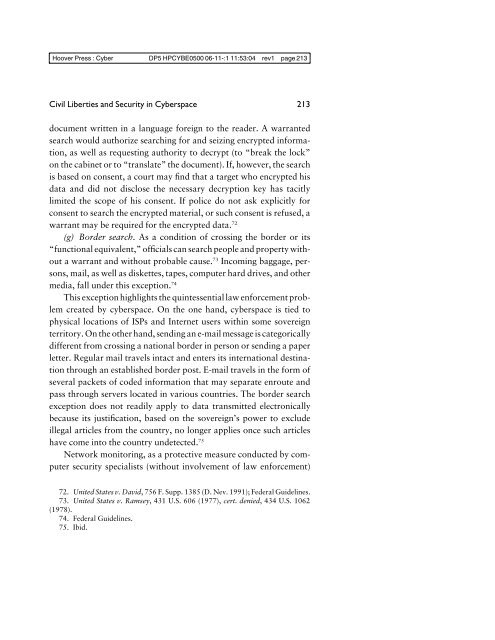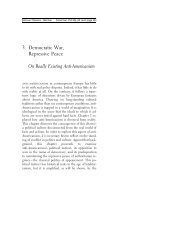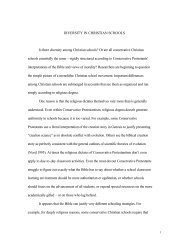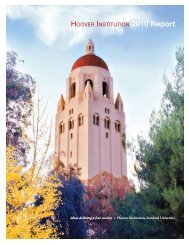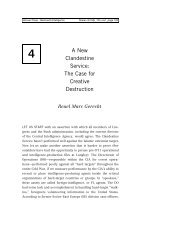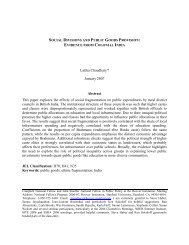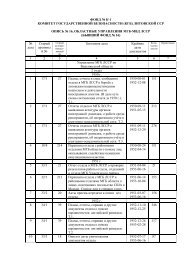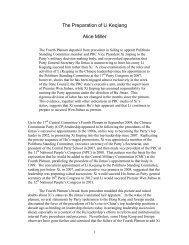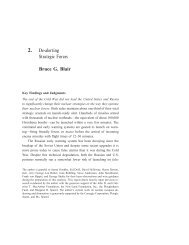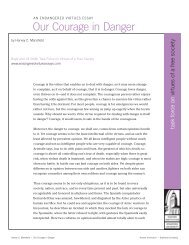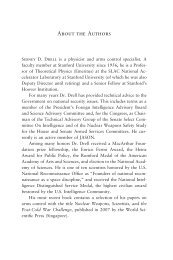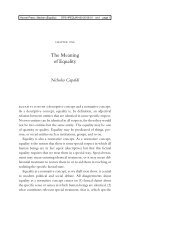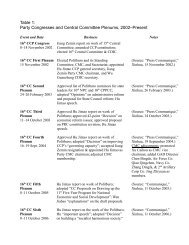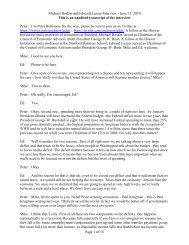Civil Liberties and Security in Cyberspace - Hoover Institution
Civil Liberties and Security in Cyberspace - Hoover Institution
Civil Liberties and Security in Cyberspace - Hoover Institution
You also want an ePaper? Increase the reach of your titles
YUMPU automatically turns print PDFs into web optimized ePapers that Google loves.
<strong>Hoover</strong> Press : Cyber DP5 HPCYBE0500 06-11-:1 11:53:04 rev1 page 213<br />
<strong>Civil</strong> <strong>Liberties</strong> <strong>and</strong> <strong>Security</strong> <strong>in</strong> <strong>Cyberspace</strong><br />
213<br />
document written <strong>in</strong> a language foreign to the reader. A warranted<br />
search would authorize search<strong>in</strong>g for <strong>and</strong> seiz<strong>in</strong>g encrypted <strong>in</strong>formation,<br />
as well as request<strong>in</strong>g authority to decrypt (to “break the lock”<br />
on the cab<strong>in</strong>et or to “translate” the document). If, however, the search<br />
is based on consent, a court may f<strong>in</strong>d that a target who encrypted his<br />
data <strong>and</strong> did not disclose the necessary decryption key has tacitly<br />
limited the scope of his consent. If police do not ask explicitly for<br />
consent to search the encrypted material, or such consent is refused, a<br />
warrant may be required for the encrypted data. 72<br />
(g) Border search. As a condition of cross<strong>in</strong>g the border or its<br />
“functional equivalent,” officials can search people <strong>and</strong> property without<br />
a warrant <strong>and</strong> without probable cause. 73 Incom<strong>in</strong>g baggage, persons,<br />
mail, as well as diskettes, tapes, computer hard drives, <strong>and</strong> other<br />
media, fall under this exception. 74<br />
This exception highlights the qu<strong>in</strong>tessential law enforcement problem<br />
created by cyberspace. On the one h<strong>and</strong>, cyberspace is tied to<br />
physical locations of ISPs <strong>and</strong> Internet users with<strong>in</strong> some sovereign<br />
territory. On the other h<strong>and</strong>, send<strong>in</strong>g an e-mail message is categorically<br />
different from cross<strong>in</strong>g a national border <strong>in</strong> person or send<strong>in</strong>g a paper<br />
letter. Regular mail travels <strong>in</strong>tact <strong>and</strong> enters its <strong>in</strong>ternational dest<strong>in</strong>ation<br />
through an established border post. E-mail travels <strong>in</strong> the form of<br />
several packets of coded <strong>in</strong>formation that may separate enroute <strong>and</strong><br />
pass through servers located <strong>in</strong> various countries. The border search<br />
exception does not readily apply to data transmitted electronically<br />
because its justification, based on the sovereign’s power to exclude<br />
illegal articles from the country, no longer applies once such articles<br />
have come <strong>in</strong>to the country undetected. 75<br />
Network monitor<strong>in</strong>g, as a protective measure conducted by computer<br />
security specialists (without <strong>in</strong>volvement of law enforcement)<br />
72. United States v. David, 756 F. Supp. 1385 (D. Nev. 1991); Federal Guidel<strong>in</strong>es.<br />
73. United States v. Ramsey, 431 U.S. 606 (1977), cert. denied, 434 U.S. 1062<br />
(1978).<br />
74. Federal Guidel<strong>in</strong>es.<br />
75. Ibid.


